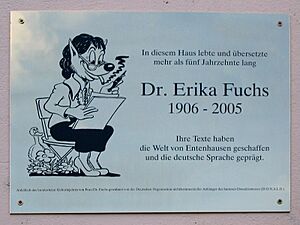Erika Fuchs facts for kids
Quick facts for kids
Erika Fuchs
|
|
|---|---|
| Born |
Johanne Theodolinde Erika Petri
7 December 1906 |
| Died | 22 April 2005 (aged 98) |
Erika Fuchs, born Petri (December 7, 1906 – April 22, 2005), was a famous German translator. She is best known for her amazing work on American Disney comics. She especially made the stories about Duckburg and its characters, like Donald Duck, popular in Germany.
Her translations were so good that they even changed the German language! She made comics respected, showing they weren't just "pulp fiction" (cheap, low-quality stories). Many people quote her translations, comparing them to great German poems. Erika Fuchs once said, "You can't be educated enough to translate comic books." This shows how seriously she took her work.
Contents
Her Life Story
Erika Fuchs was born Johanne Theodolinde Erika Petri on December 7, 1906, in Rostock. She was one of six children. Her father was an electrical engineer.
Early Years and Education
Erika spent most of her childhood in Belgard, a small town. In 1922, she made history by being the first girl ever allowed into the town's boys' high school, called a Gymnasium. She finished school there in 1926.
After high school, she studied art history in different cities like Lausanne, Munich, and London. She earned her doctorate degree in 1931. Her important paper was about German Rococo art.
Family and Home
In 1932, Erika Petri married Günter Fuchs, who was an engineer. From 1933 to 1984, they lived in Schwarzenbach an der Saale, a small industrial town. They had two sons, Thomas and Nikolaus.
Career as a Translator
After World War II, Erika Fuchs worked as a translator. She translated for the German version of Reader's Digest. She also worked for a German literature magazine.
In 1951, she became the main editor for Disney's new German Micky Maus (Mickey Mouse) magazine. She worked there until she retired in 1988.
After her husband passed away in 1984, Erika Fuchs moved to Munich. She died there on April 22, 2005, at the age of 98.
Her Amazing Work
Many of Erika Fuchs's translations from Carl Barks's comics became popular phrases in the German language.
Famous Sayings
One famous phrase often linked to her is "Dem Ingeniör ist nichts zu schwör" (meaning "nothing is too hard for an engineer"). She used it as Gyro Gearloose's catchphrase. She changed the words slightly to make them rhyme. This saying was actually based on an old German song. Her husband, who was an engineer, had heard it.
Clever References
Erika Fuchs often put clever references to classic German literature in her translations. For example, in a 1956 story called "Three Un-Ducks," Huey, Dewey, and Louie say an oath. It sounds like a funny version of a famous oath from Friedrich Schiller's play William Tell. This shows how smart and creative she was.
The "Erikativ"
She also made a special way of using verbs popular. She would shorten verbs to their basic form, like schluck (gulp) or stöhn (groan). These words were used to show sounds, but also actions without sound, like grübel (ponder) or staun (goggle).
People started calling this special verb form the Erikativ. It's a funny name that sounds like other grammar terms, but it's named after Erika Fuchs! This form was even used a lot in online chats and forums to show feelings or actions.
Honors and Legacy
Erika Fuchs received many awards for her work.
Awards and Recognition
In 2001, Erika Fuchs won the Heimito von Doderer Prize for Literature. This was for her incredible work on Disney comics.
She was also an honorary member of a group called "D.O.N.A.L.D.." This group loves and studies the world of Donald Duck comics. Some members of this group even put secret references to her work in newspaper headlines!
Art and Museums
In 1991, a painter named Gottfried Helnwein included Erika Fuchs in his artwork. It was called 48 Most Important Women of the Century. This painting is now in a museum in Cologne.
A special comic museum was opened in her hometown of Schwarzenbach an der Saale on August 1, 2015. It is named the Erika-Fuchs-Haus in her honor.
 | Shirley Ann Jackson |
 | Garett Morgan |
 | J. Ernest Wilkins Jr. |
 | Elijah McCoy |


